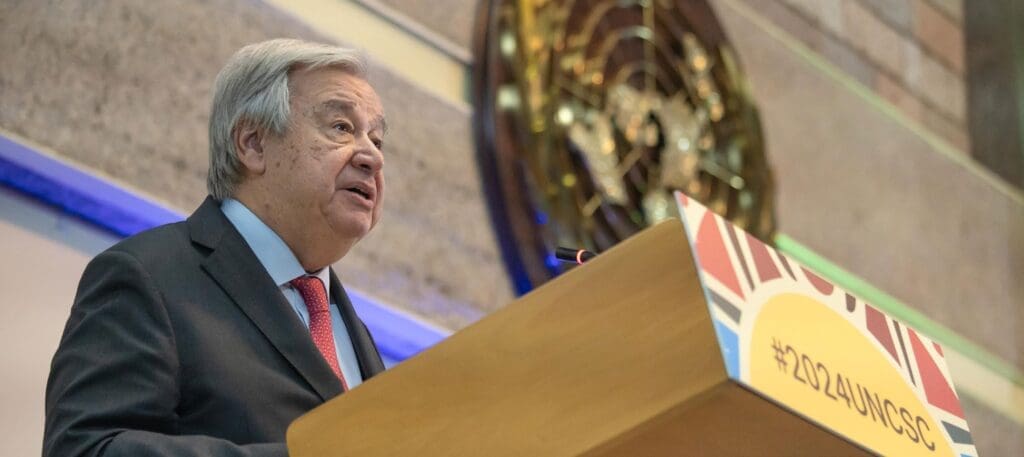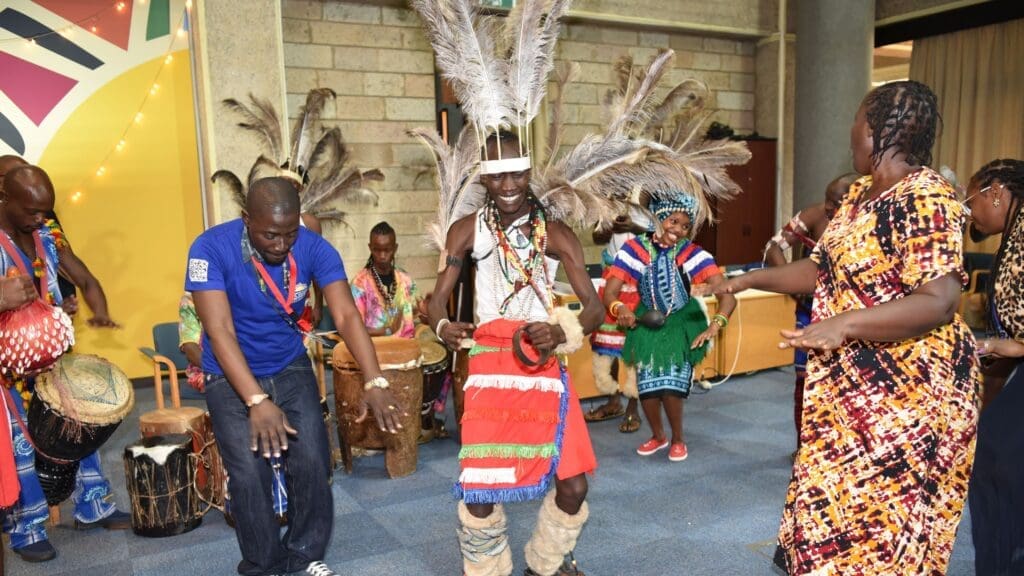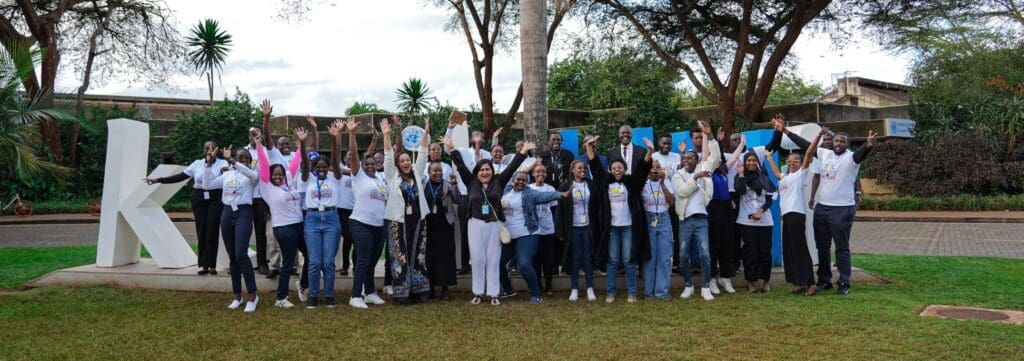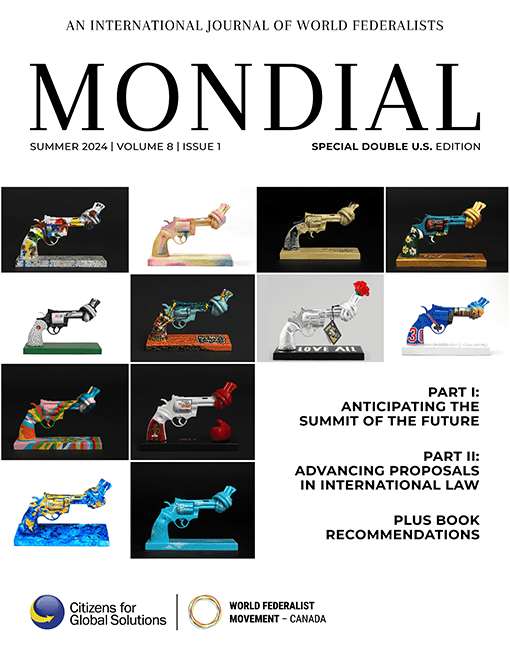Mondial Article (Summer 2024)
2024 Summit of the Future:
What it is, Why it Matters & How You Can Contribute
The first part of Mondial delves into the critical discussions and preparations for the upcoming Summit of the Future. It explores issues on the agenda, expectations of civil society, and potential outcomes that could redefine international cooperation and justice.

Richard Ponzio
Richard Ponzio is Senior Fellow and Director of the Global Governance,
Justice & Security Program at the Stimson Center in Washington, D.C.,
where he co-directs the Global Governance Innovation Network.

Nudhara Yusuf
Nudhara Yusuf is Executive Coordinator of the Global Governance Innovation Network at the Stimson Center and serves as Youth Coordinator at the Coalition for the UN We Need. She was Co-Chair of the 2024 UN Civil Society Conference in advance of the Summit of the Future.
Against the backdrop of Great Power tensions and Global North-South mistrust, the United Nations (UN) General Assembly committed to convening a Summit of the Future on September 22 and 23, 2024 in New York, aimed at “reaffirming the Charter of the UN, reinvigorating multilateralism, boosting implementation of existing commitments, agreeing on concrete solutions to challenges, and restoring trust among Member States.” This ambitious undertaking stemmed from a recommendation of the UN Secretary-General António Guterres in his Our Common Agenda report, pursuant to his mandate in the September 2020 UN75 Declaration.
At its core, the UN Summit of the Future (SOTF) offers a historic opportunity to adopt several far-reaching, high-impact global governance innovations in support of human security for all. Its success also hinges on a robust, closely monitored follow-up effort, championed by developing and developed countries alike, to support the goals and commitments adopted at the Summit.
Some of the Biggest Ideas that could shape the Summit of the Future’s Legacy
With time running down until the Summit, to be held at the UN headquarters and preceded by “SOTF Action Days” on September 20-21, the contours of its likely legacy – a more effective, networked, and inclusive multilateral system – are taking shape. Through negotiations on Revision 1 of the Summit’s main instrument, the Pact for the Future, five major initiatives are emerging:
- A Biennial Summit on the Global Economy to bring the G20 and the UN closer to expand development financing for the 2030 Agenda [Sustainable Development Goals (SDGs)] and improve global economic governance.
- An Emergency Platform for better addressing complex global shocks, such as pandemics or large-scale environmental disasters (although influential countries, such as Cuba and Pakistan, question its purpose and cost).
- A Global Digital Compact with human rights-based principles to lay the foundations for broader governance of cybertech, including artificial intelligence.
- A Declaration on Future Generations, which – if backed by an authoritative intergovernmental body, a Special Envoy, and a monitoring tool – could eventually achieve the status and impact of the Universal Declaration of Human Rights.
- National Prevention Strategies (as originally proposed in the Secretary-General’s New Agenda for Peace) to address violence and armed conflict-drivers, including by facilitating actions to quantifiably reduce violent deaths.
For all five initiatives, work remains to be done to overcome lingering mistrust, set up proper configurations (anchoring the Biennial Summit around the General Assembly’s High-Level Week rather than the Economic and Social Council), account for associated costs, create operational tools (akin to the Human Rights Council’s Universal Periodic Review), ensure implementation, and monitor progress.
Time is running short, with the second (and potentially final) revision of the Pact for the Future published on July 17 on International Justice Day, following a Third Reading by UN diplomats in New York. But progress toward several more global governance innovations is achievable, including targeted reforms and upgrades to the Security Council, General Assembly, Peacebuilding Commission, international financial architecture, environmental governance, and international judicial institutions (for recent studies on each of these topics, visit the Global Governance Innovation Network). The formation and scaling-up of some twenty ImPACT Coalitions at the recent 2024 UN Civil Society Conference offers hope for the adoption of more highly effective global governance changes by September, including ideas long championed by African and other diverse civil society groups worldwide.
The first Revision of the Pact for the Future includes 52 proposed actions and commitments by the UN’s 193 Member States. Some 24 of these actions lend direct support to at least one of the 17 SDGs, many of which represent global governance gaps identified in the September 2023 SDG Summit Political Declaration. In each of the Pact’s five chapters, the Namibian and German Co-Facilitators sought to ensure dedicated actions on gender, human rights, and sustainable development, privileging language supported by multiple delegations on strengthened multilateral cooperation.

UN Secretary-General António Guterres addresses the closing ceremony UN Civil Society Conference in Nairobi in May 2024. Credit: UNIS Nairobi.
ImPACT Coalitions and the “Spirit of Nairobi”
On May 9 and 10, 2024, thousands of participants across the world gathered in Nairobi, Kenya, and online, for the 2024 UN Civil Society Conference in Support of the Summit of the Future. Building on 68 previous UN Civil Society Conferences, this was “Conference 2.0,” as both the first to be explicitly connected to a UN intergovernmental process, and the first to take place in the Global South. This spirit showed in the new voices that were present at the conference. This global convening also hosted a vigorous and far-reaching discussion about the future in a region where our decisions today will impact the future the most, and thus is fast becoming the “Spirit of Nairobi.” The Coalition for the UN We Need, spearheaded by the World Federalist Movement – Institute for Global Policy (WFM-IGP) back in 2016, served as one of four major umbrella coalitions in initiating and leading the conference’s organization.
A particularly interesting question that arose from the Nairobi Conference was: who owns the Pact for the Future? What became clear was that no individual stakeholder group can meaningfully take full ownership of the Summit’s chief outcome document. Each has a role to play, and while the co-facilitators perform a facilitation role and Member States perform an official negotiating role, the Pact does not mean much if it is not collectively owned by “We the Peoples,” in terms of both delivering on implementation and in generating inclusive impact.
The second day of the conference gave birth to 20 multistakeholder ImPACT Coalitions, or “ICs.” The ICs represent an experiment in self-organization, bringing together civil society, international organizations, governments, and the business community on issues as diverse as international financial architecture reform, artificial intelligence and cybertech governance, peacebuilding, future generations, and funding community action. At their core, ICs assemble diverse expert stakeholders working on various Summit of the Future-related issues to create networks that support Member States who wish to champion the adoption and implementation of pathbreaking global governance innovations. They also begin the discussion of implementation early. Through this approach, the coalitions seek to ensure that both the lead-up and follow-up to the summit are based on inclusive and networked multilateralism.
This innovative approach pushes the envelope on how civil society engages with intergovernmental processes. ImPACT Coalitions enable civil society to convene proactive discussions and related actions to help multilateral institutions (which, increasingly, are multi-stakeholder in nature) and their members to progress on commonly agreed priority goals and commitments. Individual members of the World Federalist Movement and Citizens for Global Solutions are highly encouraged to reach out to the focal points and get directly involved in the work – before and after the Summit of the Future – of the 20 ImPACT Coalitions.
During the lead up to the Summit, these self-organized groups could become a support system for experts in New York negotiating on behalf of Member States. Beyond September, the ICs could serve as a connective bridge between civil society, the private sector, existing UN initiatives, and capitals by facilitating the communication of core messaging and managing Summit of the Future expectations within related policy and civil society-led fora.

Photo from the 2024 UN Civil Society Conference capturing the “Spirit of Nairobi” during the Opening Ceremonies”. Credit: UNIS Nairobi.
Taking the Summit of the Future’s Agreed Actions Forward: A Possible Role for Article 109?
The Summit of the Future can be both a milestone and the first step in a longer journey for global governance renewal and innovation. Beyond shaping its agenda, coalitions of like-minded champion governments and nongovernmental partners – ideally, taking shape along the lines of the nascent ImPACT Coalitions outlined above – are necessary to ensure tangible, as well as measurable, delivery on specific Pact for the Future, Global Digital Compact, and Declaration on Future Generations goals and commitments.
Unlike the UN75 Declaration’s broad vision and vague 12 actions, the Pact for the Future’s comparative strength will rely on securing distinct collective political commitments, including ambitious global governance innovations. Whether the Summit matters also depends on how well Member States, senior international civil servants, and their partners in civil society and the corporate world come together to carry out and monitor the agenda adopted in September.
Although limited to Security Council reform, the Secretary-General’s High-Level Advisory Board on Effective Multilateralism recommended consideration of Article 109 Charter revision. A worthwhile exercise post-September would involve assessing whether additional Charter amendments might help in fulfilling other goals and commitments in the Pact for the Future.
Just as the UN’s founders advised in June 1945, we must recognize the UN Charter’s imperfections, the need to improve it, and to demystify as well as push back against Charter review detractors. With political attention expected to shift to the post-2030 development agenda and other exigencies facing the next Secretary-General in early 2027, the end of the 80th General Assembly in 2026 offers an ideal moment to push for long-overdue structural changes in our global governance system and to renew humanity’s appreciation for the international rule of law.
Approaching this project with a degree of humility and a long-term perspective is essential. The pace of artificial intelligence and other technological changes alone ensure that whatever reforms agreed to by Member States in September 2024 will require significant updating by at least 2045 (the UN’s centenary), let alone later in the century. The framers of the UN Charter understood this critical insight and encouraged updating and, when necessary, remodeling of the world body and its many constituent parts. Today’s generation must also contend with new complex global issues – including preventing future pandemics, moving away from fossil fuels to a renewable energy driven economy, and other “long problems” that demand strategic foresight and multi-generational planning and execution (something few, if any, governments seem to incentivize).
This is a time for statespersons from across the Global North and South to step up and exert sustained and unapologetic enlightened global leadership. Increasingly, they have a clear-cut choice to make. Reflecting the decades-long, positive transformation underway in global governance, world leaders who accept and take on – rather than express indifference and shun – today’s toughest global challenges will be joined by a myriad of diverse, well-resourced, and networked partners across civil society and the business community. We owe this renewed commitment to collective global action to today’s younger generation and all future generations, both to fulfill their most urgent human needs, while charting an environmentally sustainable course toward the realization of their highest aspirations.

Photo from the 2024 UN Civil Society Conference capturing the “Spirit of Nairobi” during the Opening Ceremonies”. Credit: UNIS Nairobi.
Mondial is published by the Citizens for Global Solutions (CGS) and World Federalist Movement — Canada (WFM-Canada), non-profit, non-partisan, and non-governmental Member Organizations of the World Federalist Movement-Institute for Government Policy (WFM-IGP). Mondial seeks to provide a forum for diverse voices and opinions on topics related to democratic world federation. The views expressed by contributing authors herein do not necessarily reflect the organizational positions of CGS or WFM-Canada, or those of the Masthead membership.





























